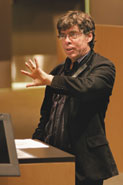The science of vacuum pumps and power
The science of vacuum pumps and power McGill University
User Tools (skip):
The science of vacuum pumps and power
Pay no attention to the man behind the curtain," said Simon Schaffer, for the D. Lorne Gales Lecture in the History of Science. The University of Cambridge professor of History and Philosophy of Science viisted McGill in late September.

Simon Schaffer delivers the Gales Lecture as part of the History and Philosophy of Science Seminar Series. Info: www.mcgill.ca/hpsc.
Owen Egan
Schaffer borrowed from the Wizard of Oz to start his Sept. 27 lecture "Why Trust Public Experiments? An Historical Perspective."
Scientific experts complain that the public doesn't give them credibility, Schaffer noted. During the GMO debate of 2000, the head of Monsanto lamented, "'We're still in the 'trust me' mode, when the public's saying 'show me'.'"
Researchers are nostalgic for the rosy past when trust in scientific expertise trumped skepticism. Schaffer's response is that "public experimentation was always mixed up and difficult," and we now have a surfeit of experts "even wedding organizers!"
Authorities - scientific and political - have always demonstrated their expertise to the public, often by involving them in experiments.
Consider Otto von Guericke, 17th-century philosopher of vacuum pumps and political representative of Magdeburg, a city destroyed by imperial troops. He demonstrated his machines' powers at the politically important Imperial Diet (Reichstag) in 1653-54 at Regensburg. Large copper hemispheres, sealed together to form a globe, had the air extracted from them, after which teams of horses strained to pull the half-domes apart. With just a flick of a lever, horses would tumble, and von Guericke had demonstrated his craft's supremacy over man's strongest beast, and made a plug for his rebuilt city's autonomy.
In 1660s Florence, the Academy of Experiments posited that antimony could be used as a gentle laxative. After all, when heated it purged rubbish from gold, and so surely it could purge rubbish from humans, the gold of creation, Schaffer related. And so the Grand Duke Ferdinand de Medici endorsed a trial in which "four dozen Florentines were hauled in from the streets surrounding the Pitti Palace, fed, given the laxative and put in a locked room where their performance was monitored by a court lackey," he said.
Another spectacular display of power commingled with divine science was that of the miraculous Royal Touch in Restoration England. Those with certified scrofula (a.k.a. king's evil) would be allowed audience with the king in a regularly held, public ceremony, at which the sovereign would heal them with a touch. They were then given a specially minted gold coin, and sent off.
Schaffer ended his lecture with a chilling, more recent example; that of politicians and scientists chatting over a Pentagon lunch in the 1940s about whether a non-military demonstration of atomic weapons over, say, a barren island, could end the war. Schaffer reminds us that Robert Oppenheimer said "no firecracker over a desert" would end it, while the physicists held that it might be difficult to persuade the world that a nation capable of suddenly releasing such a destructive weapon is to be trusted.
The public has often been implicated in experimentation, and the power those experiments wield goes beyond science. Clearly, Schaffer finished, "the nostalgia of some scientists must be contested."

